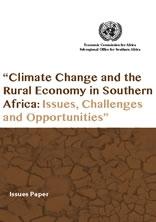“Climate Change and the Rural Economy in Southern Africa: Issues, Challenges and Opportunities”

Global warming is already affecting Africa and other regions and is expected to worsen in coming decades. The Southern African Development Community (SADC) subregion is among the most affected regions in the world.
Climate assessments for Southern Africa conclude that the subregion is likely to become warmer and drier; a temperature increase of 2°–5°C is predicted over the coming decades and increasingly variable rainfall is anticipated. An increase in both frequency and intensity of extreme events, mainly droughts and floods, is also anticipated.
Rural economies in Southern Africa are particularly sensitive to the direct impacts of climate change, because many of them depend heavily on agriculture and ecosystems and because of their high poverty levels and geographic exposure. Many people in the subregion, especially the poor, depend directly on agriculture as their primary source of food and livelihood. Most of the extreme poor in Southern Africa (83 per cent) are located in the rural areas. Apart from farming, other rural economic activities include fishery, forestry, pottery, tourism and small-scale businesses. Most of these non-farm activities depend on biodiversity and ecosystems.